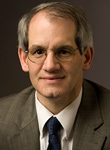Task force calls for a single, comprehensive budget model
By Susan Kelley

Cornell should adopt a single budget model that covers the entire Ithaca campus, is easy to understand and helps enable the university to achieve and advance institutional priorities and excellence.
That's the main recommendation of a budget model task force report, released Jan. 19. "In this financial climate, we wanted a model that is easy to understand and makes it easy to monitor our financial position, but as important, a model that supports the advancement of both unit-level and institutional priorities," said Paul Streeter, co-chair of the task force and associate vice president.
The report will not affect the 2010-11 budget, which will be released in March. However, the recommendations and the campus community's reaction to them could significantly affect how the university allocates its resources by as early as July 1, 2011, the start of the 2012 fiscal year.
Perhaps the biggest change the task force calls for is to pool all undergraduate tuition -- Cornell's largest revenue stream, which provides about 35 percent of the Ithaca campus's revenue -- which would then be redistributed by the provost, based on several considerations and data such as university priorities, college of enrollment and college of instruction, Streeter said.
Task force member Kent Kleinman, dean of the College of Architecture, Art and Planning, said that one of the task force's highest priorities was to devise a budget model that honored Cornell's commitment to an academically diverse undergraduate experience. "To support this principle, the proposed budget model gathers all undergraduate tuition in a collective pool rather than channeling it directly to the individual colleges," Kleinman said. "This is a distinctive and somewhat idiosyncratic feature of the model -- a reflection of the special value that all members of the task force placed on encouraging a barrier-free academic environment for our undergraduate students."
The task force also recommended creating a "university support pool." It would allow the provost, as the campus budget officer, to support initiatives that serve the university as a whole; the pool would be funded by a small percentage of various revenue streams, Streeter said.
Public events on task force report
A summary of the Budget Model Task Force Report is online at http://www.cornell.edu/reimagining/. The full report is available for review Monday through Friday in the Office of the Dean of Faculty (9 a.m.-3 p.m.) and in the Office of the Assemblies (8:30 a.m.-12:15 p.m. and 1-4:30 p.m.).
Provost Kent Fuchs will host public events on the budget task force report:
• Feb. 5, 12:15-1:15 p.m., brown bag lunch, Robison Hall of Fame Room, Friends Hall, Schoellkopf Memorial Hall, and;
• Feb. 11, 4:30-5:30 p.m., public discussion, Statler Auditorium.
For more information, see the strategic planning Web site, http://www.cornell.edu/reimagining/.
Currently, the university uses four major budget models. There's one for the contract colleges; another for the Colleges of Architecture, Art and Planning, Arts and Sciences, and Engineering and the central administration; a third for the Hotel, Law and Johnson Schools; and a fourth for enterprise and cost-recovery units.
The multiple models not only make the university's financial situation difficult to understand, but they also create sometimes opposing incentives and behaviors for the various operating units, Streeter said. "These differences create real challenges in managing common activities and collaborating across units."
Provost Kent Fuchs charged the task force in spring 2009 with creating one budget model to cover the entire university; it did so by trying to strike a balance between two extremes. On one end of the spectrum is a model in which every dollar goes to the Office of the Provost, and the provost decides who gets what. On the other end, is a model in which each college keeps whatever money it brings in. "What we tried to do is create a hybrid model that has elements of both, and fits our culture," Streeter said.
Now, Fuchs is soliciting feedback on the task force recommendations. In late spring, he will announce the budget model the university will adopt and will then form an implementation committee to hash out the details on how to institute the model for fiscal year 2012.
Media Contact
Get Cornell news delivered right to your inbox.
Subscribe